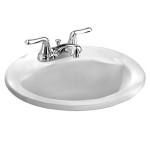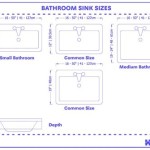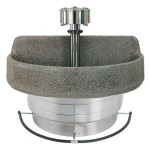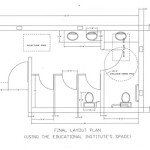The Complete Bathroom Sink: A Guide to Choosing the Right One
The bathroom sink is an essential fixture in any home, serving as a focal point for daily hygiene and a key element of bathroom design. Choosing the right bathroom sink can be a daunting task, with an overwhelming array of styles, materials, and features to consider. This guide provides a comprehensive overview of bathroom sinks, covering key factors to consider, popular styles, and essential maintenance tips.
Understanding Bathroom Sink Types
Bathroom sinks are broadly categorized into two primary types: vessel sinks and undermount sinks. Each type offers distinct aesthetic and functional advantages.
Vessel Sinks
Vessel sinks, also known as countertop sinks, are freestanding bowls that sit on the countertop. They typically have a wider rim, providing a stylish and elegant look. Vessel sinks offer several advantages:
- Versatility: They can be installed on various countertop materials, including granite, marble, and wood.
- Aesthetic Appeal: Their unique design adds a touch of sophistication to any bathroom.
- Easy Installation: Typically, they are easier to install compared to undermount sinks.
However, vessel sinks also have some drawbacks:
- Limited Counter Space: The protruding bowl takes up valuable countertop space.
- Splash Potential: The wider rim can lead to more splashing.
- Higher Water Usage: They often require more water to fill, particularly for deeper bowls.
Undermount Sinks
Undermount sinks are installed beneath the countertop, resulting in a seamless and sleek look. They are preferred for their modern and minimalist aesthetic. Undermount sinks offer several advantages:
- Maximum Counter Space: The sink sits flush with the countertop, providing more usable space.
- Easy Cleaning: The seamless design allows for easy wiping and cleaning of the countertop.
- Modern Appearance: Undermount sinks create a contemporary and sophisticated look.
However, undermount sinks also have some drawbacks:
- More Difficult Installation: Installing undermount sinks requires precise cutting and mounting, often necessitating professional assistance.
- Limited Countertop Options: They can only be installed on solid surfaces like granite or marble.
- Potentially Higher Cost: Undermount sinks may be more expensive than vessel sinks.
Choosing the Right Material
Bathroom sinks are available in a wide variety of materials, each offering specific advantages and drawbacks.
Ceramic
Ceramic is the most common material used for bathroom sinks. It is durable, affordable, and easy to clean. Ceramic sinks come in various colors and designs.
Porcelain
Porcelain is a type of ceramic with a smoother finish and increased durability. Porcelain sinks are known for their elegant appearance and resistance to scratches and stains.
Stainless Steel
Stainless steel sinks are a popular choice for modern bathrooms. They are resistant to heat and corrosion, making them extremely durable. Stainless steel sinks are typically more expensive than ceramic or porcelain sinks.
Cast Iron
Cast iron sinks are heavy and durable, offering excellent heat retention. They are often coated with porcelain enamel, providing a smooth and easy-to-clean surface. Cast iron sinks are typically more expensive than other types.
Other Important Considerations
Beyond the type and material, several other factors should be considered when choosing a bathroom sink:
Size
The size of the sink is crucial. It should be large enough to accommodate your needs, but not so large that it overwhelms the bathroom space.
Faucet Type
The faucet should complement the style of the sink and offer the desired functionality. Consider whether a single-handle, double-handle, or touchless faucet best suits your needs.
Drain Type
The drain type should match the sink's style and size. Choose a drain that prevents clogs and provides smooth water flow.
Additional Features
Some sinks offer additional features like built-in soap dispensers or storage compartments. Consider whether these features are relevant to your needs.
Maintenance Tips
Maintaining your bathroom sink is essential for longevity and aesthetics. Follow these tips to keep your sink in excellent condition:
- Clean Regularly: Wipe down the sink after each use with a damp cloth and mild soap.
- Avoid Harsh Chemicals: Using abrasive cleaners or bleach can damage the finish of the sink. Opt for mild cleaning solutions.
- Clean the Drain: Regularly clean the drain to prevent clogs.
- Dry Thoroughly: After cleaning, dry the sink with a soft cloth to prevent water spots.
By carefully considering the factors discussed above, you can choose the right bathroom sink that meets your needs and enhances the style of your bathroom.

How To Choose A Sink That Makes Your Bathroom Complete Kikiinteriors Com

Modern Home Furniture Complete Bathroom Sets Wall Hung Bath Room Vanity Cabinets With Artificial Stone Basin China Sink Mirror Cabinet Made In Com

4 Types Of High End Bathroom Sinks For Your Remodel Gerety Restoration

Status Ivo Brushed Brass Complete Bathroom Suite With 1200mm Bath And 500mm Vanity Unit

Modern Bathroom Sink Complete Set With Cabinet Lavatory Wash Basin Makeup Mirror Wall Mounted Drawer Lazada Ph

Concert 80 Complete Bathroom Vanity Unit Modo Bath

A Complete Guide On How To Choose The Right Wash Basin For Your Bathroom Kerovit Blog

Modern Home Furniture Complete Bathroom Sets Wall Hung Bath Room Vanity Cabinets With Artificial Stone Basin China Sink Mirror Cabinet Made In Com

A Complete Guide To Bathroom Sinks Mlm Incorporated

Nomad Ivo Complete Bathroom Suite Package With 1500mm Bath And 600mm Vanity Unit
Related Posts







